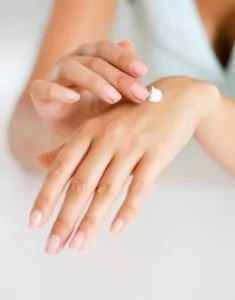If the promises sound too good to be true, they probably are just that – too good to be true.
Most of us were victims of deceptive marketing strategies from cosmetic companies at one time or another. The labels boast youthful results. They prey on our insecurities and encourage us to purchase expensive products. Can scientists validate these claims?
Dr Fayne Frey, board-certified dermatologist and a frequent contributor to 50Plus-Today, says no. In the 4/14/2019 issue of The Doctor Weighs In, Dr. Frey implores skin care product manufacturers to engage in responsible marketing based on truthful information. As per Dr. Frey,
“The Skincare Industry Needs True Transparency.”
“Don’t get me wrong” she says. “There is a portion of the skincare industry that manufactures effective personal care products. These products truly benefit consumers’ health and well-being. Unfortunately, the good actors are drowned out by the marketing frenzy created by the “beauty” industry as a whole.”
Dr. Frey states that the cosmetic industry, currently valued at 500 billion dollars and growing, withholds important information from the consumer, promises eternal youth, and offers unproven solutions to skin health. In fact, much of the industry makes “deceptive claims that neither science nor personal experience can validate”.
The Benefits of Skincare Products

We know science can validate the health benefits of moisturizing the skin. For example, many skin conditions, such as acne, eczema, and psoriasis, improve with the use of moisturizers. But choosing between products that improve skin hydration and those that do not isn’t easy. How does the average consumer know which product actually works?
The health benefits of applying daily sunscreen are also well-documented. Getting in the habit of using sunscreen regularly promotes both long-term improvement of skin appearance and the prevention of skin cancer.
Unfortunately, research does not back up other claims made on skin care product labels. Advertisements boldly claim their product will eliminate wrinkles, fade age spots, and make your skin look younger and brighter. In Dr. Frey’s opinion, this type of marketing is unethical and exploits consumers.
Tricks of the Trade in Skincare
Deceptive repackaging
Adding to the confusion are deceptive repackaging practices. According to Dr. Frey, cosmetic companies sometimes repackage inexpensive and commonly used moisturizing lotions in small tubes, then sell them as expensive hand creams. The products contain the exact same ingredients, but the marketing is different.
Seductive claims of anti-aging
Scientists have yet to find a single ingredient that can slow or reverse aging. Wouldn’t it be nice if they could? Facial products labeled with terms like “anti-aging” or “age-defying” are not to be trusted. These products may be beneficial as moisturizers, but they can’t change the skin. If that were the case, FDA approval would be required by law.
The eye cream myth.
Eye creams are just moisturizers and the skin around your eyes is no different than that on your cheekbone. As per Dr. Frey, under a microscope, samples from each area when compared look the same to a dermatologist. Are eye creams really needed?
Night creams that are also day creams.
Night creams are one of Dr. Frey’s pet peeves. “Do you think your skin knows the time of day?” she asks. Night creams are generally packaged in smaller containers and are more expensive than day creams, but the ingredients and function are the same. The exception might be when your day cream contains sunscreen and therefore the ingredients are not exactly the same.
Other products you don’t need.
Exfoliants, masks, scrubs, toners, astringents, and products with “natural” plant-derived ingredients may feel good on the skin, but no scientific evidence exists to prove any health benefits. In truth, some of these products may be harmful, causing adverse effects such as excessive drying.
Scare Tactics
Some skincare products boast they are “free from” a particular ingredient. So what? Does it matter? The marketing message behind the label is trying to say this product is healthier than the others when this is not necessarily the case.
Parabens
All water-based products, which include most facial and body moisturizers, require a preservative to prevent contamination from bacteria and mold growth. Parabens are a commonly used class of preservatives that are not toxic for humans when used in approved doses of less than 1%. However, stories from the media and consumer advocacy groups attribute negative health effects to parabens – which in turn creates unnecessary consumer demand for paraben-free products. As a result, the cosmetic industry now has a new market segment to exploit. Dr. Frey wonders if consumers think to ask what alternative preservative is used in the paraben-free products. And are these alternative preservatives better?
“Natural” products
The term “natural”, sometimes referred to as “chemical free”, may imply where ingredients come from – for example, oils and extracts from herbs, plant roots, or flowers. “Natural” doesn’t necessarily mean safe, though it sounds good on a label. Some poisons are “natural”, but still harmful. The term “chemical-free” doesn’t make sense at all as every ingredient in a skincare product is a chemical, including those derived from plants. Even water is a chemical, a necessary one for a healthy body in the right amount.
Good for the planet products
Don’t you love when manufacturers claim they are “green”, but sell products with unnecessary and often non-biodegradable plastic packages? I believe these companies are truly concerned about sustainability and climate change when they become more responsible with their packaging. For now, labeling products as “good for the planet” is just another marketing strategy.
The Bottom Line
Dr. Frey is a passionate advocate for consumers of skincare products. She believes “skincare manufacturers should engage in trustworthy principled marketing that encourages consumers to purchase beneficial skincare products based on science.” She strives to educate people about false claims about skin care products.
About the Author: Fayne Frey, M.D.
Dr. Frey works tirelessly to provide consumers with factual information to help them choose skin care products wisely. Her website, fryface.com, is a free science-based skincare information website created to make selecting products easy.

Fayne Frey, M.D., is a board-certified clinical and surgical dermatologist practicing in West Nyack, New York, where she specializes in the diagnosis and treatment of skin cancer. She is a nationally recognized expert in the effectiveness and formulation of over-the-counter skincare products, and, as a speaker, has captivated audiences with her wry observations regarding the skincare industry. She has consulted for numerous media outlets, including NBC, USA Today, and, the Huffington Post, and has shared her expertise on both cable and major TV outlets. Dr. Frey is the Founder of FryFace.com, an educational skincare information and product selection service website that clarifies and simplifies the overwhelming choice of effective, safe, and affordable products encountered in the skincare aisles. Dr. Frey is a fellow of both the American Academy of Dermatology and the American Society for Dermatologic Surgery.
OTHER ARTICLES BY DR. FREY:
Let’s Be Accurate: Moisturizers Don’t Add Water to the Skin
Do You Exfoliate? Why This Board-Certified Dermatologist Does Not
Do You Wash Your Face Before or After You Shower? Notes From a Dermatologist
FAQs
Here are some commonly asked questions about claims made by skincare manufacturers about their products.
Why do some skincare manufacturers make false claims about their products?
Some manufacturers may make false claims to boost sales and compete in a crowded market. Misleading marketing can attract consumers looking for quick fixes or miracle products.
How can consumers spot false claims on skincare products?
Consumers should look for scientific evidence, ingredient lists, and realistic promises on product packaging. Beware of exaggerated claims that promise immediate or miraculous results.
Do all skincare manufacturers make false claims?
No, not all skincare manufacturers make false claims. Many reputable brands prioritize transparency, research, and accurate marketing to build trust with their customers.
Why do consumers sometimes fall for false skincare claims?
Consumers may be influenced by persuasive advertising, peer recommendations, or a desire for quick results. The complexity of skincare science can also make it challenging for consumers to differentiate between fact and fiction.
Are there any red flags that indicate a skincare product might be making false claims?
Red flags may include products that claim to cure all skin issues, use sensational language, lack ingredient transparency, or promise unrealistic results without scientific evidence.
What can consumers do to support ethical skincare brands and discourage false claims?
Consumers can support ethical brands by researching their products before buying and sharing honest reviews. Supporting transparent and evidence-based skincare brands can encourage responsible practices in the industry.











why do you think night face cream is the same as day????? they are usually not. The discernable difference is the day cream sometimes has sunscreen in it or is a different weight…lighter feel.
That’s a good point – if sunscreen is added to the day cream, then it is different than the night cream. Thanks
Thanks for sharing. False promises , tricks in trade. this is really a eye opener. we are expecting more on it.